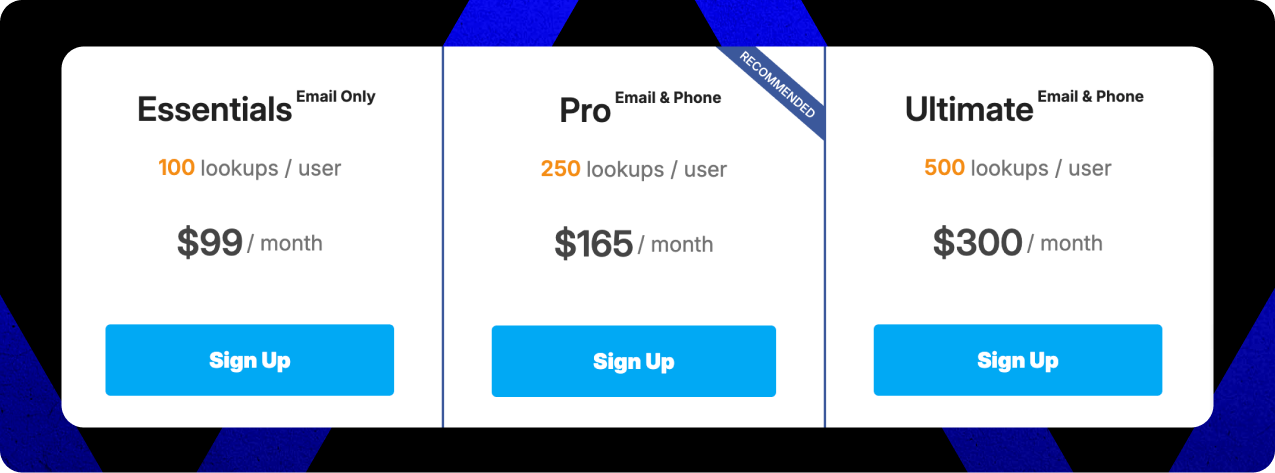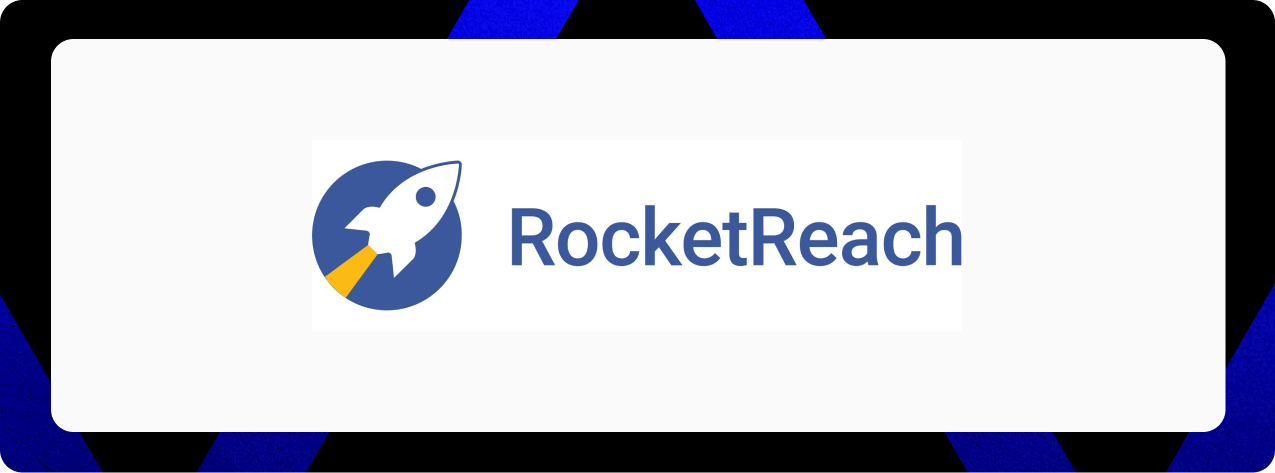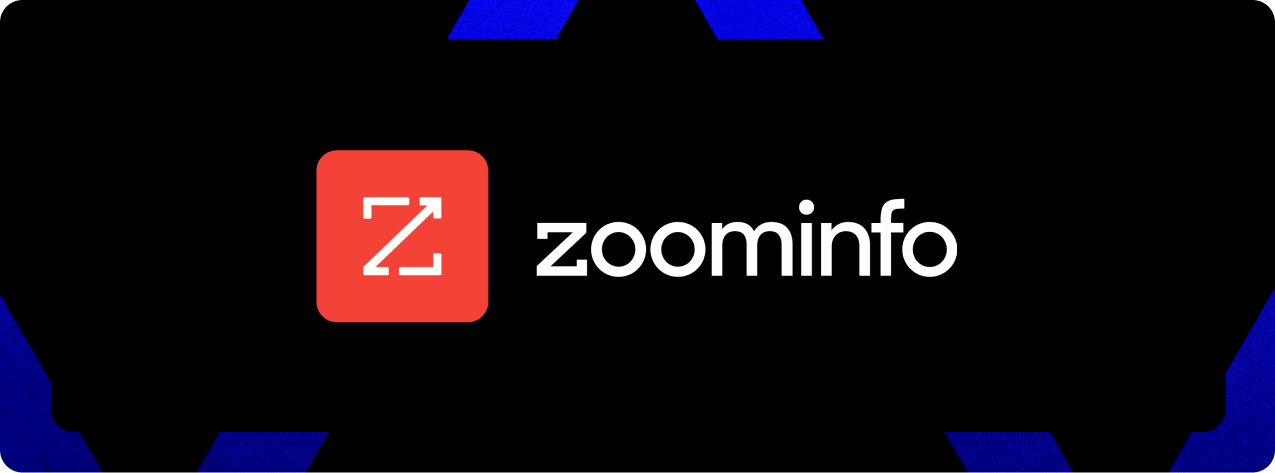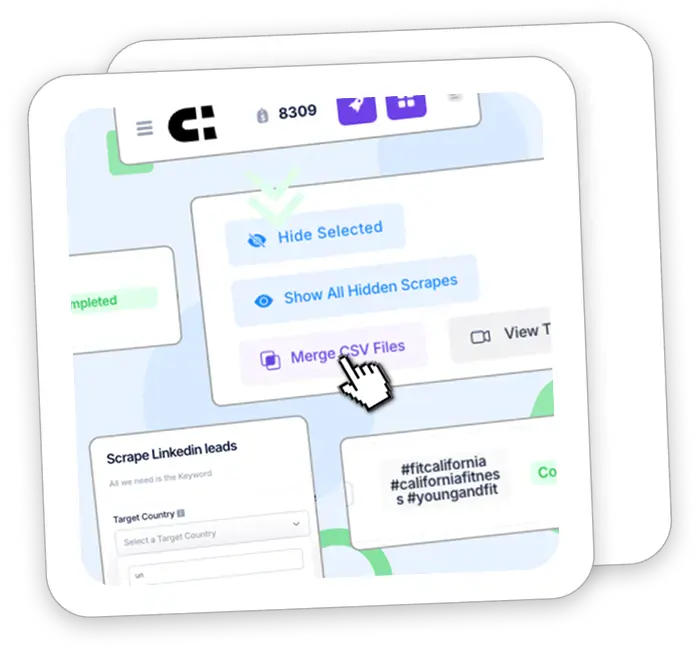RocketReach Pricing : Is It Worth It In 2025?

Sales reps waste 5.5 hours every week just hunting for contact info. That’s more than a full workday lost to manual prospecting. RocketReach claims to fix this with access to 700+ million professionals and 35+ million companies, but the real question is whether their pricing makes sense for your workflow.
The numbers look impressive at first glance. Companies with solid lead generation outperform competitors by 133%. RocketReach boasts an 85% data accuracy rate across plans that range from $36 to $249 monthly when billed annually. The entry-level Essentials plan gives you 1,500 annual lookups, while Ultimate jumps to 10,000 lookups plus API access and Salesforce integration.
But here’s where it gets tricky. Users report unexpected charges from hitting monthly lookup limits. Others complain about credit systems that feel more like playing defense than building pipeline. And with pricing that varies dramatically based on features, team size, and billing cycles, figuring out what you’ll actually pay can be a headache.
This guide breaks down RocketReach’s real costs, hidden fees, and whether each plan delivers value for different team sizes. We’ll also compare it against leaner alternatives like IGLeads that offer tiered pricing model. So, let’s dig in:
What You Actually Get With Each RocketReach Plan
RocketReach splits its features across three main tiers, each built for different prospecting volumes and team needs. Here’s what’s included at each level and whether the features justify the cost.
Essentials Plan: Email-Only Prospecting
Contact Database Access ⭐⭐⭐
The Essentials plan gives you access to RocketReach’s core email database with 80-100 monthly lookups (unlimited with annual billing). The RocketReach Chrome extension loads 84% faster than previous versions and works across company websites and social platforms, letting you grab contact info while browsing.
What I like: The Chrome extension is genuinely useful for casual LinkedIn prospecting. You can pull emails on the fly without switching between tabs or logging into dashboards.
Key limitations: No phone numbers, no bulk searching, and limited CRM integration. You get basic CSV exports, but that’s about it for workflow automation.
Best for: Solo freelancers or consultants doing light email outreach with under 100 contacts monthly.
Pro Plan: Bulk Features + Phone Numbers
Mobile & Direct Dial Access ⭐⭐⭐⭐
Pro unlocks mobile and direct dial phone numbers, plus increases your monthly lookup allowance to 200-250 depending on billing cycle. The bulk lookup feature via CSV upload eliminates manual searching for larger lists.
CRM Integrations ⭐⭐⭐⭐
HubSpot, Salesloft, and Outreach integrations help streamline your workflow between prospecting and actual outreach. You also get company search functionality and technographic data for targeting prospects based on their tech stack.
What I like: Bulk CSV uploads save massive time if you’re working with existing lead lists. The technographic filtering helps solution sellers target companies already using complementary tools.
Best for: Small sales teams (2-5 people) running regular prospecting campaigns with mixed email and phone outreach.
Ultimate Plan: API Access + Enterprise Features
API Integration ⭐⭐⭐⭐⭐
Ultimate subscribers get full API access with higher request limits, plus dedicated Salesforce integration that auto-populates contact data directly into your CRM. Works with Enterprise, Unlimited, and Professional Salesforce editions.
Organizational Intelligence ⭐⭐⭐
Org charts and company trends give you visibility into reporting structures and decision-maker identification. With 10,000 annual exports, even large teams have enough capacity for extensive campaigns.
What I like: The Salesforce sync is genuinely seamless for enterprise users. Org charts help with account-based selling by showing you exactly who reports to whom.
Enterprise Features ⭐⭐⭐⭐
Custom API quotas, data mapping controls, and Team Admin features for Salesforce users. One export credit consumed per contact exported through the API.
Best for: Enterprise sales teams with 10+ users who need deep CRM integration and custom workflow automation.
API Pricing Breakdown by Tier
| Plan | API Access | Request Limits | Custom Integration |
|---|---|---|---|
| Essentials | Extremely limited | Low |  No No |
| Pro |  Basic access Basic access |
 Medium Medium |
 Partial Partial |
| Ultimate |  Full access Full access |
 High High |
 Yes Yes |
| Enterprise |  Custom quotas Custom quotas |
 Custom Custom |
 Full mapping control Full mapping control |
Bottom line: The feature progression makes sense, but you’ll hit usage limits fast on lower tiers. If you’re doing serious prospecting, expect to upgrade within a few months of starting with Essentials.
This article is about RocketReach pricing. Click here if you want to read our full-detailed RocketReach review.
What RocketReach Actually Costs in 2025
Pricing makes or breaks most tool decisions. After testing every RocketReach plan, here’s what you’ll actually pay and whether it’s worth it.
Monthly vs Annual: The Real Price Difference
The annual discount is substantial but comes with a catch. Monthly billing for Essentials runs $53, but drops to $36 monthly when paid annually ($576/year). That’s a 32% savings for committing upfront.
Pro plan pricing jumps dramatically: $179 monthly vs $126 annually. Ultimate hits $359 monthly but $252 with annual billing. You’ll save 30-35% across all tiers, but only if you’re confident about long-term usage.
Here’s what most people miss: annual plans include annual credit allocations, instead of monthly limits. The Essentials annual plan gives you 1,500 yearly lookups, while Pro jumps to 4,500. That changes the math completely.
How RocketReach Credits Actually Work
Every successful search burns one “lookup credit.” No data found? No credit used. Sounds fair, but there’s more to it.
Most users hit 80-85% success rates for emails and around 65% for phone numbers. Run out of credits mid-month? You’ll pay $0.30 to $0.45 per extra lookup, depending on your plan. Export credits work separately from lookups, adding another layer to track.
The good news: once you’ve looked up a contact, it stays in your list permanently. No double-charging for the same person.
The Free Plan Reality Check
RocketReach offers 5 free lookups monthly with no credit card required. It’s email-only, no phones, no bulk features. Good for testing data quality in your niche, but that’s about it.
There’s no traditional free trial of paid features. Those 5 lookups disappear fast if you’re doing serious prospecting. Unlike competitors with full-feature trials, you’re buying somewhat blind.
Bottom Line: What You’ll Actually Pay
- Essentials: $36-$53/month for emails, $63-$89/month with phones
- Pro: $72-$107/month for emails, $126-$179/month with phones
- Ultimate: $180-$269/month for emails, $252-$359/month with phones
RocketReach has increased pricing 10-30% since 2023. Pro plan monthly jumped 30%, Ultimate monthly shot up 50%. For enterprise needs, you’ll need custom quotes based on team size and volume.
The credit system and billing complexity make budgeting tricky. If you’re hitting lookup limits regularly or need predictable costs, flat-rate alternatives like IGLeads might make more sense for your workflow.
What Real Users Actually Say About RocketReach Pricing
Marketing pages tell one story. User reviews tell another. After digging through hundreds of reviews across G2, Reddit, and Trustpilot, the real picture of RocketReach pricing becomes much clearer—and it’s not always pretty.
The Review Split That Says Everything
Here’s what’s weird: RocketReach gets 4.5/5 stars on G2 but only 1.3/5 on Trustpilot. That’s a massive gap. And when you read the actual complaints, most center around one thing—pricing surprises and credit confusion.
The credit system trips up users constantly. One Reddit user put it simply: “I’ve used RocketReach for LinkedIn prospecting… It’s decent, but I’ve had mixed accuracy with the results”. That “mixed accuracy” becomes a bigger problem when you’re paying per lookup, regardless of whether the data is actually good.
Hidden Costs and Billing Surprises
Users consistently report being blindsided by RocketReach’s pricing structure. A Trustpilot reviewer explained: “I signed up thinking I was getting unlimited contact lookups based on their plan descriptions. Turns out, the Essentials plan only gives you 100 credits, something buried in the fine print”.
Auto-renewals catch people off guard too. One user warned: “They charged me and refused a refund… Watch out if you’re on automatic renewal – you won’t get a reminder & you can’t cancel”. Multiple users report similar experiences with unexpected charges and inflexible refund policies.
The refund situation gets worse. Several reviewers describe requesting refunds within 24 hours only to be told “all sales are final”. One frustrated user called it “a bait-and-switch” after being denied a refund despite unclear plan messaging.
Data Quality vs. Cost Concerns
Even satisfied users acknowledge accuracy issues that affect the value proposition. A common refrain: “about 20% of contacts I look up have bad information, emails, phone”. When you’re paying per lookup, getting charged for bad data feels unfair.
One Capterra reviewer summed up the frustration: “If a contact has bad information possibly you shouldn’t charge that as a user lookup?”. But RocketReach charges credits whether the data is accurate or not.
The Positive Side
Not everything is negative. Some users genuinely find value, especially compared to enterprise alternatives. One noted: “RocketReach is and was 10 times cheaper than the other platform that we were using while producing the same results”. Another praised its “ease of use and integration with LinkedIn”.
Users who stick with RocketReach often frame it in terms of relative value: “What really stood out for us compared to other similar solutions was pricing”. The key seems to be managing expectations and understanding the limitations upfront.
User Advice for Prospective Buyers
Experienced users consistently recommend starting small. Test the free plan thoroughly before committing to paid tiers. Verify data accuracy for your specific target audience. And read those terms carefully—especially around auto-renewals and refunds.
The pattern is clear: RocketReach can deliver value, but only if you understand exactly what you’re paying for and accept the limitations that come with credit-based pricing.
Which RocketReach Plan Makes Sense for Your Team?
Picking the right RocketReach plan isn’t about features, it’s about matching your actual prospecting volume with what you’ll pay. After testing each tier for different team sizes, here’s what works and what doesn’t.
Solo Users: Free Plan First, Then Consider Essentials
If you’re doing fewer than 50 lookups weekly, start with the free plan’s 5 monthly lookups. It’s risk-free and gives you a real feel for data accuracy in your niche. The Essentials plan makes sense for solo prospectors who hit those limits consistently. You get 1,200 exports annually, which covers most individual email campaigns without breaking the bank.
What I like: The Essentials plan is straightforward for solo users who need email-only prospecting. But remember, you’ll pay extra for phone numbers if your strategy evolves.
Small Teams: Pro Plan for Bulk Workflows
Teams handling around 100 leads monthly should look at Pro. It’s built for 2-5 person teams who need streamlined billing and don’t want to manage multiple individual accounts. The bulk lookup feature alone saves hours of manual searching, and mobile numbers come included. CRM integrations with HubSpot, Outreach, and Zapier actually work smoothly.
Bottom line: Pro makes sense when manual lookups become a bottleneck. The bulk features and phone data justify the jump in price for active prospecting teams.
Enterprise Teams: Ultimate or Custom Pricing
Organizations with 5+ users benefit from Ultimate’s unlimited premium lookups and dedicated support. The organizational charts and trend analysis are genuinely useful for agencies working complex B2B accounts. Custom team plans add extras like suppression lists and intent data.
What I like: Ultimate’s API access and Salesforce integration work as advertised. But you’re paying enterprise prices for features most smaller teams won’t use.
Smart Upgrade Strategy: Test Before You Commit
Start with a lower tier and upgrade when you actually hit limits. RocketReach lets you upgrade anytime from your account. When upgrading mid-cycle, you can start immediately or wait for your next billing date. Unused lookups roll over as credit.
This approach saves money upfront and lets you validate data accuracy for your specific audience before committing to higher-priced plans. No point paying for enterprise features if the contacts you need aren’t in their database.
RocketReach vs IGLeads: Which Tool Delivers Better Value?
Convinced of a RocketReach alternative? IGLeads and RocketReach tools solve prospecting problems, but they take completely different approaches. After testing both platforms extensively, the price-to-value ratio depends entirely on what kind of leads you’re chasing and how much you’re willing to spend for them.
Comparing IGLeads With RocketReach
When you put IGLeads head-to-head with RocketReach, the pricing structure and flexibility differences are clear:
| Feature | RocketReach | IGLeads |
|---|---|---|
| Pricing Transparency | ⚠️ Tiered, credit-based, varies by usage and billing cycle | ✅ Flat-rate monthly pricing with no hidden fees |
| Lead Credits System | ⚠️ Pay-per-lookup, risk of running out of credits | ✅ No credits — scrape as needed within your plan |
| Phone Number Access | ⚠️ Locked behind higher tiers (Pro and Ultimate) | ✅ Available in all plans when scraping local business data |
| Platform Coverage | ⚠️ Focused on corporate B2B databases only | ✅ Covers Google Maps, LinkedIn, Instagram, YouTube, and more |
| Free Plan or Trial | ⚠️ 5 email lookups/month (no phones, no bulk) | ✅ Full-featured free plan to explore scraping power |
| Ease of Use | ⚠️ More complex with API/credit tracking | ✅ Point-and-click interface, zero learning curve |
| Contract Commitments | ⚠️ Annual billing for best pricing, auto-renewal complaints | ✅ Monthly plans, easy to cancel anytime |
Pricing Models: Credits vs Flat Rate
Here’s where the fundamental difference hits you. RocketReach operates on a credit-based system where each successful lookup burns one credit. Their Essentials plan costs $99/month for limited lookups, while Pro jumps to $165/month for additional features.
IGLeads offers tiered pricing: $59/month for their Starter Plan (10k emails monthly), $149/month for their Business Plan (50k emails monthly), and $299/month for their Unlimited Plan. With annual billing, these prices drop to $49, $79, and $239 respectively. Heavy users might still save significantly, but it’s important to select the appropriate tier based on your needs.
When RocketReach Makes Sense
RocketReach excels for enterprise-level prospecting across major corporations. With access to over 700 million profiles, 330 million emails, and 150 million direct-dial numbers, it’s built for teams targeting Fortune 500 decision-makers. The AI-powered lookalike prospecting helps identify similar contacts based on your saved leads, perfect for account-based marketing campaigns focused on established companies.
If you’re selling to large enterprises with structured org charts and need verified phone numbers for C-suite executives, RocketReach’s database depth justifies the cost.
When IGLeads Delivers Better Results (And Costs Less)
For local businesses, creators, consultants, or agencies targeting specialized niches, IGLeads is the smarter choice. The platform excels at scraping leads from Instagram, Google Maps, YouTube, and LinkedIn – channels RocketReach simply doesn’t touch. You’ll never hit unexpected charges or credit limits that kill your momentum mid-campaign.
For example, IGLeads’ Google Maps scraper lets you build hyper-local business lists with full contact details. The clean interface requires zero training – just select your filters, hit scrape, and export leads directly to your cold email tool. No credits. No complexity.
Bottom Line: Choose Based on Your Lead Sources
RocketReach wins for traditional B2B prospecting with established companies. IGLeads dominates for social media-based prospecting, local lead generation, and non-enterprise outreach. The pricing difference alone makes IGLeads the better value for most solo operators and small teams.
Start using IGLeads for free if you’re tired of counting credits and want unlimited access to specialized lead sources that traditional tools ignore.
Related to rocketreach
- RocketReach vs ZoomInfo: Which One Is Better for Small Sales Teams?
- 16 RocketReach Alternatives Worth Trying in 2025
- RocketReach Chrome Extension: Setup, How to use and Alternatives
- The 2025 Rocketreach Review: What You Need to Know Before You Buy
Frequently Asked Questions
RocketReach offers annual pricing options that range from $576 to $3,024 per year, depending on the plan chosen. Annual billing provides significant discounts compared to monthly rates, with savings of 30-35% across all plans.
RocketReach can be valuable for sales teams, especially those targeting large corporations. It offers access to over 700 million professional profiles and features like bulk lookups and CRM integrations. However, the value depends on your specific prospecting needs and budget.
The Essentials plan focuses on basic email lookups, the Pro plan adds features like bulk lookup and mobile numbers, while the Ultimate plan includes API access and Salesforce integration. Higher tiers also offer more monthly lookups and advanced features.
RocketReach uses a credit-based system where each successful lookup consumes one credit. Credits are only used when verified contact information is found. Additional credits can be purchased if you run out, with prices ranging from $0.30 to $0.45 per lookup.
Yes, alternatives like IGLeads offer tiered pricing starting at $49/month (annual) or $59/month (monthly) for the Starter Plan with 10,000 emails. The Business Plan is $79/month (annual) for 50,000 emails, and the Unlimited Plan is $239/month (annual) for unlimited emails. IGLeads is ideal for specialized leads from sources like Instagram, Google Maps, and YouTube, which RocketReach doesn’t cover.



